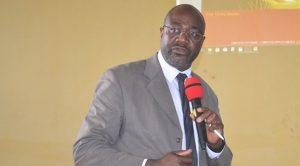In what appears to be a landmark move for environmental and economic sustainability, the Centre for Climate Change and Development (CCCD) at the Alex Ekwueme Federal University has unveiled the Nigeria Deep Decarbonisation Pathways (DDP-Nigeria) project report.

The comprehensive document, the culmination of rigorous national and international collaboration, marks a significant milestone in Nigeria’s commitment to achieving net-zero emissions and spearheading sustainable development across Africa.
The DDP-Nigeria project is a national research and capacity-building initiative for the implementation of a Deep Decarbonisation Pathway (DDP) in Nigeria under the framework of the 2050 Facility funded by the French Development Agency (AFD) with the Institute for Sustainable Development and International Relations (IDDRI) as the Programme Coordinator with contributions from the International Research Centre on Environment and Development (CIRED) France. The project was done in collaboration with the Federal Ministry of Environment, Nigeria, through the Department of Climate Change (DCC) and the National Council on Climate Change (NCCC).
The DDP-Nigeria project was driven by a core team of research experts, advisory board members, a national management committee and a national technical/steering committee, all in an effort to align with the country’s environmental and economic development aspiration. The DDP-Nigeria was anchored on three central pillars – mobilisation and capacity building of local teams of experts and researchers, production of Nigeria context-sensitive low-emission development strategies, and structuration of a community of practice among Nigerian and African research institutions to facilitate climate change knowledge sharing.
The project was conceived to appropriately respond to the low-emission development commitment of the Federal Government of Nigeria in many local and international forums. In developed nations, low-emission development policies are crafted based on rigorous studies of the economic sectors, which are heavily based on long-term modelling of development scenarios.
Therefore, the analytical framework used in the DDP-Nigeria project hybridised energy-macroeconomic modelling approach, with key assumptions derived from the economic sectors (power, transport, building and residential, oil and gas, industry and AFOLU – Agriculture, forestry and other land use) based on the Nationally Determined Contributions (NDC), the Energy Transition Plan (ETP), FGN’s pronouncement at COP26 in Glasgow, and the vast natural resources (natural gas and renewable energy, for example). The hybrid framework provides comprehensive information to support decision-making regarding socioeconomic development paths and the evolution of sustainable (environmentally friendly) energy systems away from fossil-based ones.
The Deep Decarbonisation Pathways report is enriched with detailed analyses across key energy sectors, offering a variety of trajectories Nigeria could follow to meet its net-zero commitments. These pathways are informed by rich datasets, groundbreaking economic analyses, and insights that consider both the immediate and long-term implications of decarbonisation efforts.
The DDP-Nigeria report provides information on the quantifications of four imagined future development pathways (that is, scenarios): Business as Usual (BAU), Currently Policy Scenario (CPS), Gas Economy Scenario (GES), and Renewable Energy Scenario (RES), all of which provide alternative pathways on how Nigeria could navigate the complex energy transition terrain to achieve net zero economy up to 2060, as well as the macroeconomic implications of the imagined future development pathways.
The key findings suggest that the energy sector contributes about 54% of the current year’s (2018) national emissions (424.30 MtCO2eq), which was followed by Agriculture, Forestry, and Other Land Use (AFOLU) at about 30%. More than 50% of the emissions from the energy sector were from the oil and gas subsector, which are related to commercial production and transformation of oil and gas. Under a BAU scenario, Nigeria’s cumulative emissions will be about 1053 MtCO2eq by 2060. The drivers of the emissions are attributed to the continuous use of fossil fuels, firewood and charcoal, which have far-reaching consequences on health, biological diversity, and climate change. The results indicate that the CPS, GES, and RES, respectively, could reduce the current year emissions by 24.4%, 30.1%, and 61.5% in 2050, whereas the reduction would be 36.7%, 78.3%, and 96.8% in 2060, respectively. It shows that only the RES has the potential to achieve the government’s net zero emissions pledge at COP26.
From a purely macroeconomic point of view, over 39 years, the cumulated international financial aid (IFA) would amount to $880 billion to drive the Renewable Energy Scenario. The IFA is roughly half of the overall cost of Nigeria’s Energy Transition Plan, estimated at $1.9 trillion. In addition, the analysis shows that, with the IFA, Nigeria’s economy can be improved under the low-emission development pathways because of the positive impact on the employment rate.
In conclusion, the decarbonisation of the Nigerian economy will strongly depend on the use of natural gas as a transition fuel and the utilisation of renewable energy sources (solar, wind, hydropower, and bioenergy) and other clean energy sources (e.g., nuclear) coupled with climate-smart sectorial measures (e.g., energy efficiency and energy management measures) and greening technologies (e.g., carbon capture and sequestration).
“Today, we stand on the precipice of a transformative era,” said Prof. Chukwumerije Okereke, the Director of CCCD and the report’s coordinating lead author. “This document is not merely a plan but a blueprint for sustainable development, integrating economic growth with environmental stewardship.”
By Ogheneruona Diemuodeke and Chukwuemeka Emenekwe, Research Fellows in the DDP-Nigeria project
